Sponsor a child!

Latin America Resource
and Training Center
|
|
2015 Educational
Leaders Dialogue Report
By Rod and Sherry Boyd
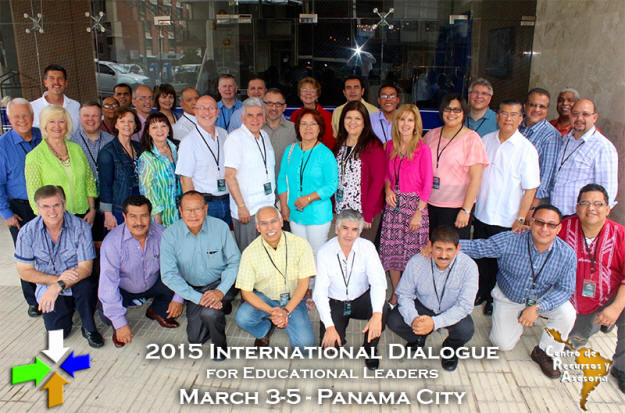
Panama City, Panama – March 3-7, 2015. Some
would call it a think tank; others a strategy session. We call it the
Educational Leaders Dialogue. Every two years the
Latin America Resource and Training Center (LARTC) team here in
Panama hosts educational leaders from around Spanish-speaking Latin America.
We had 39 leaders present from 14 countries that included most of the
national Directors of Christian Education, four national superintendents and
several of our international educational team.
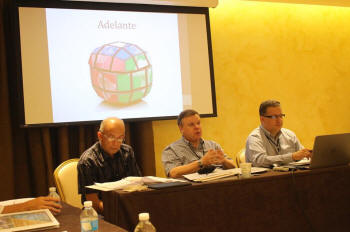 The
meeting was conducted by Rod, with segments being led by Jorge Echazabal and
Miguel Morales. This is the first Dialogue of many more to come for Miguel
and Maria Morales!The purpose of the Dialogue is to identify areas of need
or concern in the ministerial training program in Latin America and advance
solutions to these needs. We have developed what we call the
Dialogue Method that includes four segments: The
meeting was conducted by Rod, with segments being led by Jorge Echazabal and
Miguel Morales. This is the first Dialogue of many more to come for Miguel
and Maria Morales!The purpose of the Dialogue is to identify areas of need
or concern in the ministerial training program in Latin America and advance
solutions to these needs. We have developed what we call the
Dialogue Method that includes four segments:
-
Country reports that include
statistical information, successes, new programs and areas of need. Each
report concludes with adding the most significant need or concern to the
list.
-
Consolidation and selection of themes
involves combining similar themes so that all countries continue to be
represented. The goal is to identify 4-6 themes.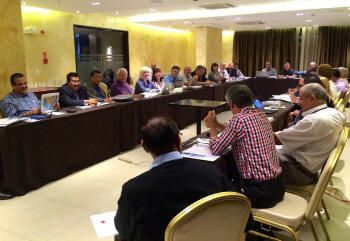
-
Small groups are assigned a theme
and are asked to use the reporter questions—what, who, why, how and
when—to advance solutions to needs and concerns identified.
-
Group reports are shared by each
small group to the larger group that includes time for question and
answer, even modification of specific proposals. This report section
transitions to the Ministerial Training Committee meeting that processes
all of the individual proposals made by the small groups as well as
additional points of business.
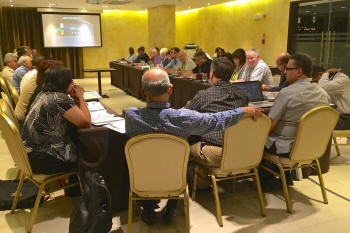
Truly, the Dialogue is much more about process rather
than product. The Dialogue is a small event by design, held during the odd
years. For us, it is our opportunity to listen to the hearts of our leaders.
It is a first-name basis meeting of equals, with all seated around an “O”
shape of tables to maximize eye contact. Our goal is to affirm each person
to maximize participation. Everyone has something to contribute.
In
contrast, the Summits, most held in the even years, are large events
designed to inspire and equip. It is our opportunity to speak to the needs
identified in the previous Dialogue. This two-year cycle of “listen and
speak” has been used since 2001.
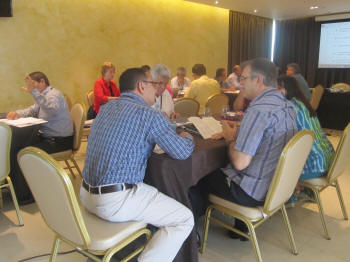
The themes chosen this year reflect the complexity of the
ministerial training program on our continent and how these programs are
directly linked to national and international initiatives. Following is a
synopsis of each group’s work:
-
Pentecostal in Practice. How
do we activate and maintain a focus on our teachers and students being
practicing Pentecostals? The group recommended that a survey be
developed and conducted throughout Latin America to begin discussion
about what a Pentecostal Bible School, class, teacher and student means
and practical steps that can be taken to activate and maintain this
focus.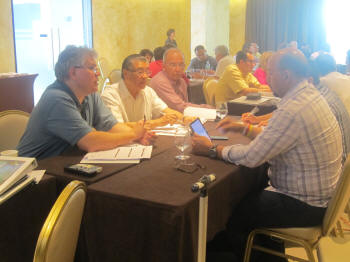
-
Church Planting. How can our Bible
schools produce your workers that are committed to planting churches in
conjunction with each country’s church planting goals and initiatives?
Practical solutions included developing clear national strategies that
include proactive recruitment of young ministers for church planting,
implement the recently developed Church Planting specialization (major),
and add a practicum to the Church Planting specialization.
-
Implementing Specializations
(Majors). How can we help our Bible schools to activate and implement
the different ministry specializations (Pastoral, Youth Ministries,
Missions, Christian Education, Children’s Ministries, Church Planting,
and University Ministries) in their teaching programs? Suggestions
included emphasizing flexibility in implementing specializations that
could include special “ministry schools” in specializations, naming and
empowering a coordinator for specializations, and allowing students to
begin specialization classes early in their Bible school experience.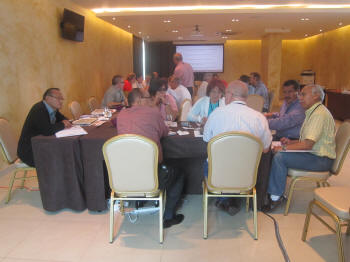
-
Bible School Extensions. How can we
better extend, support and supervise Bible School Extension schools that
are often located in remote areas of a country, reaching indigenous
populations? Several specific suggestions were offered.
-
Identifying Ministerial Competencies.
What is the profile of Pentecostal ministerial competencies that are
needed today? A profile of competencies was developed in the following
areas: spiritual, administrative, social, educational and church.
Several steps were identified to heighten awareness, survey current
competencies and make changes to the teaching plan for the Bible school
level.
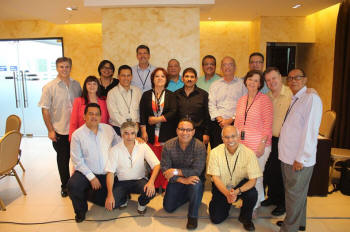 The first ever Theological Council was
conducted as a second event immediately following the Dialogue. About
two-thirds of the Dialogue participants stayed over to participate in this
meeting led by Jon Dahlager, President of the Assemblies of God Latin
America Theological Association. In addition to certifying Bible school
teachers and Bible schools, the theological association also promotes sound
doctrine and teaching. Different leaders and educators presented topics
related to the general theme 21st Century Latin America Pentecostalism. The first ever Theological Council was
conducted as a second event immediately following the Dialogue. About
two-thirds of the Dialogue participants stayed over to participate in this
meeting led by Jon Dahlager, President of the Assemblies of God Latin
America Theological Association. In addition to certifying Bible school
teachers and Bible schools, the theological association also promotes sound
doctrine and teaching. Different leaders and educators presented topics
related to the general theme 21st Century Latin America Pentecostalism.
The Educational Leaders Dialogue has become an essential
element in the overall strategy of the Latin America Resource and Training
Center to inspire and enable leaders, equip teachers and workers, and
develop needed resources for them.
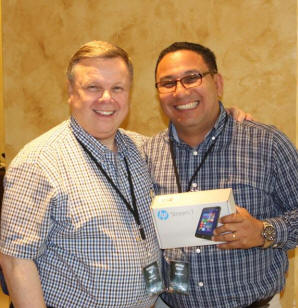 Why do we invest ourselves in ministerial training?
We are following the 2 Timothy 2:2 model: "The things you've heard
me say in the presence of many witnesses entrust to reliable men who will be
faithful to teacher others." We are training the trainers
of the next generation of harvest workers! Why do we invest ourselves in ministerial training?
We are following the 2 Timothy 2:2 model: "The things you've heard
me say in the presence of many witnesses entrust to reliable men who will be
faithful to teacher others." We are training the trainers
of the next generation of harvest workers!
Even though we are in the States for itineration ministry
through June, we received special permission to travel to Panama to lead
this meeting. It was a stressful several days that included itineration
ministry the Sundays before and after the Dialogue. Yet we know we are
buoyed by an army of family and friends who faithfully pray for us. Don’t
stop!
|